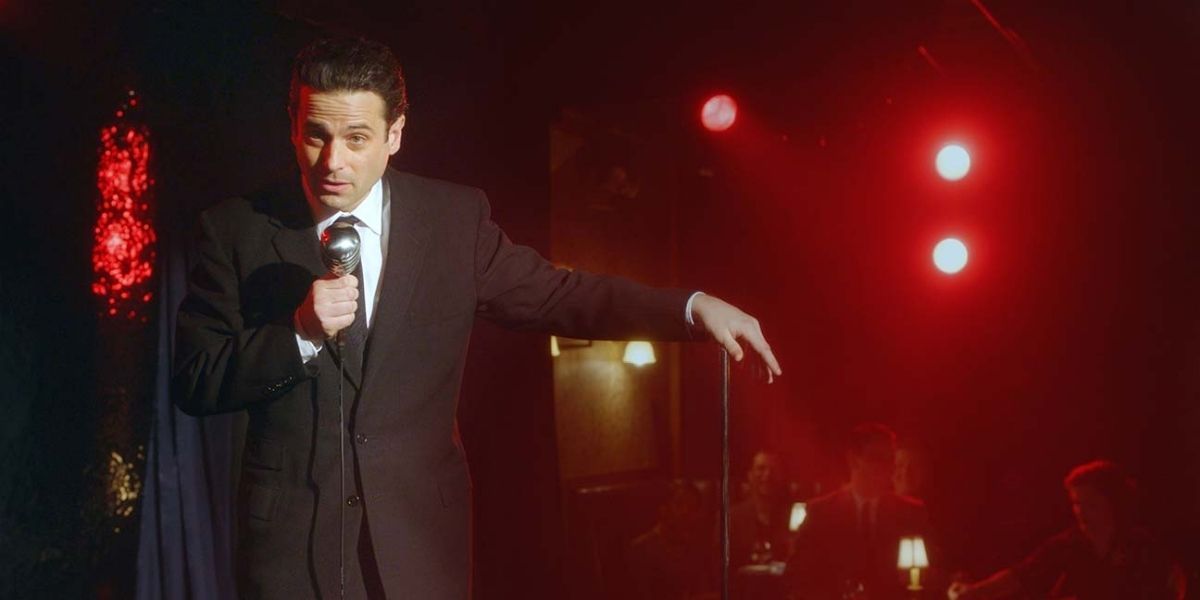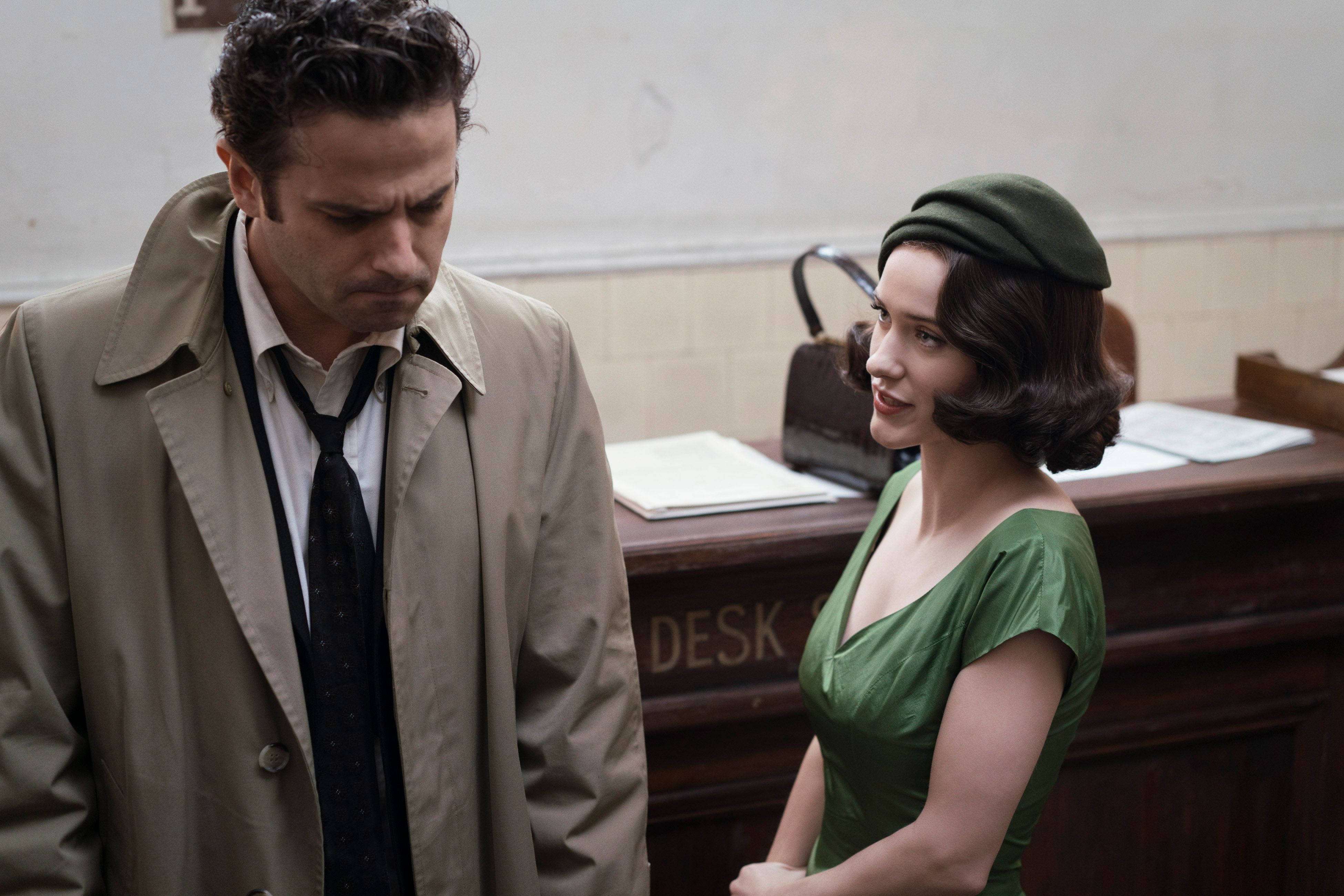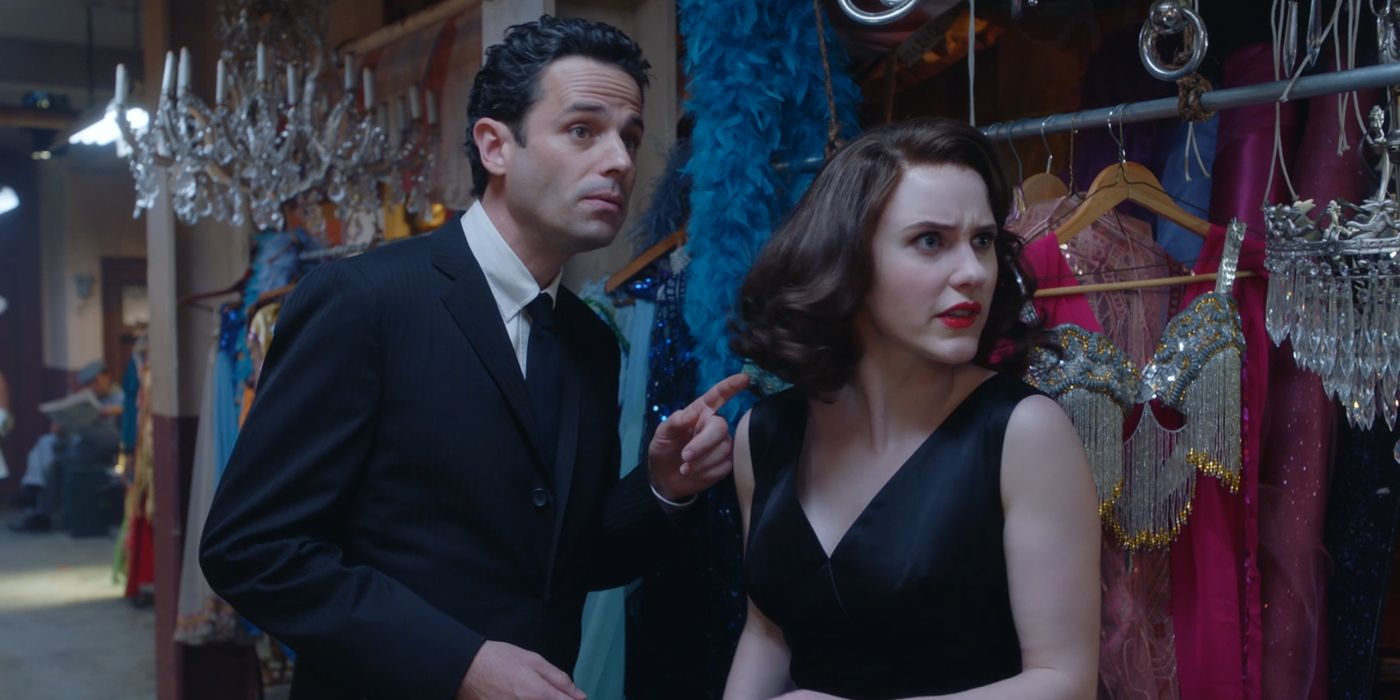Unlike many characters in The Marvelous Mrs. Maisel, like talk show host Gordon Ford (a Johnny Carson stand-in) or comic Sophie Lennon (Phyllis Diller/Totie Fields blend), Lenny Bruce was not fictional nor a composite character — he was real. Known as the Godfather of modern stand-up (along with Mort Sahl), Lenny paved the way for legendary comics such as George Carlin, Joan Rivers, and Richard Pryor, but not without a cost. He talked about politics, religion, race, sex, and drugs when it was unseemly to do so on stage, even for a man.
Rachel Brosnahan, who plays Midge Maisel, has described Lenny in Midge’s fictional universe as her “fairy godmother.” He flirts and floats out of Midge’s life, helping her along the way, only to disappear in a pervertible puff of smoke. After all, this is Midge’s story, and this fictional Lenny Bruce (played by Luke Kirby) is at the whim of the Maisel narrative. Many have argued that turning Bruce into this kind of romantic figure, in every sense of the word, goes against his true nature — except that Bruce has already been branded a mythical figure in the comedy world for years.

The ballad of Lenny Bruce is one of a “subversive” or “sick comic,” a drug addict who pushed established social mores, the First Amendment, and obscenity laws until he spent more time in a jail cell than on a club stage. Bruce paved the way for modern comics and storytellers like monologists/playwrights Eric Bogosian (Uncut Gems; Law & Order), who hero-worshipped him. Bogosian even added the moniker of “Saint” to Bruce’s spiritual monogram. But those who knew Lenny, like friend and comic contemporary Shelly Berman, said Lenny would consider the idea that he was “heroic” as “hypocrisy,” according to George Nachman‘s book Seriously Funny: The Rebel Comedians of the 1950s and 1960s. And the fictional Lenny, according to The Marvelous Mrs. Maisel, would agree. In the Season 4 finale, Lenny literally scoffs at Midge regarding the “pedestal” he feels she has placed him on and has no interest in being a “stand-up Messiah.” All Lenny Bruce wanted, both in his real and fictional incarnations, was to do was his job, to be funny. And getting arrested was not a means to that goal, but a deterrent.
In Maisel, Midge and fictional Lenny strikes up a friendship that leads to romance through esteem for each other’s talent. So much so that just as they are about to make the leap from friends to lovers, Midge makes Lenny promise her that “… you will never, ever forget that I am very, very funny.” It isn’t about ego; it’s about respect. Midge doesn’t want to lose the respect Lenny gives her as a comic. As a woman in 1960, let alone a female comic in 1960, respect was hard to find in the world at large. A time when women weren’t seen as comics or writers but as “girl writers” and “female comics.” And although Belle Barth was getting arrested in Florida as early as 1953 for her bawdy routines, it wasn’t until 1960 that she recorded her first comedy album. 1960 was a critical year for funny women making their comic marks into a new decade, but it was also the start of the fiery decline of the former Leonard Schneider, a Jewish kid from Bellmore, Long Island, known as Lenny Bruce.

The midnight show at Carnegie Hall in February of 1961 was the pinnacle of Lenny’s success (changed to 1960 in the series). The fact that audiences would travel through a blizzard to see Lenny do stand-up confirmed his popularity. Yet, in the fall of that same year, he was arrested in San Francisco for saying “c**ksucker” on stage at the Jazz Workshop. His arrest led to an obscenity trial. He was acquitted, but the arrests didn’t stop. In 1962, he was arrested again in California for shows at The Troubadour and The Unicorn. (one of his “offensive” words: schmuck). Both trials ended in a hung jury. In Chicago, he wasn’t so lucky, and after his arrest on stage at the Gates of Horn, he was convicted and sentenced to a year in jail. While on bail awaiting his appeal, Lenny flew to London to perform, only to be banned from the country indefinitely. By 1964 he was arrested in Greenwich Village, NYC, his spiritual and literal home. The New York artistic community came out in droves to speak on his behalf, from Bob Dylan to James Baldwin. Unfortunately, their words weren’t enough, and in 1964 Lenny was convicted and sentenced to four months in a workhouse.
Once again, he was out on bail while on appeal. In fear of booking him, U.S. clubs began to blacklist him. And although he wasn’t banned from Australia, things didn’t go well Down Under either. His drug use got worse and affected his health. In 1964, he fell forty feet outside a hotel window pretending to fly (his imitation of “Superjew”) and broke his arm and hurt his back. By 1966 he was blacklisted by almost all the U.S. clubs, and the king of comedy, Lenny Bruce, could no longer do what he loved — perform stand-up. His worst fear was realized. By the summer of 1966, he was dead of a drug overdose. Many say his death was a slow suicide and that what really killed Lenny Bruce was comedy. Or lack thereof. Bruce’s manager Jack Rollins felt that Bruce had “sinned against his talent.” The first one through the door always gets hurt, they say, and his change from “degenerate” to holy man seemed to happen overnight, according to Joan Rivers, in Nachman’s book.
“….so what does he get for this? He gets arrested for talking dirty and dies a broken man. Now people are calling him the Rabelais of his time. The day after he died, The Time’s obituary included comparisons to Swift and Twain. And I said, “this poor slob couldn’t get a cabaret card” — which you needed in those days.”
Rivers (whose real life heavily influenced Maisel) had a friendship with Bruce similar to Midge and Lenny’s in the series. However, near the end of her life, Joan would waffle on whether their relationship had also turned romantic or not. Still, she wasn’t shy about expressing her attraction to him.
According to Rivers, Lenny was the biggest influence on her life — he “changed it all” for her. Joan loved to tell a story about how after bombing at a club one night, she exited the stage to find a note from Bruce: “They’re wrong, your right.” It meant so much to Joan that she kept the note in her bra. Years later, she told the story to George Carlin, who confessed that Bruce had given him the same note, and not just him, but to all the comics he believed had talent. In Maisel, Lenny shows this side of him through his encouragement and support of Midge’s act and career. Lenny Bruce’s role in Maisel is special because we see him before the sad ending, unlike other dramatized depictions of his life.

Due to Kirby’s transcendent performance as Bruce (he won an Emmy for the role) and Kirby and Brosnahan’s electric chemistry, Lenny’s role went from pilot cameo to a continuous role over several seasons. Still, even with Lenny’s beefed-up role in the series, he and Midge feel like two ships in the night, which ultimately feels by design. After four seasons of sexual tension, the final coupling of these two “will they or won’t they” characters doesn’t feel random but purposeful and specific. Based on Bruce’s history and where the series appears to be headed, Lenny and Midge seem to come together at the exact point where their lives diverge in opposite directions. It is, in cosmic terms, called a” stellar collision.” Two shooting stars with opposite trajectories, almost switching places as they collide in space and time. Midge on her way up and Lenny on his way down. What makes this moment unique and not just another “fan service” hook up of a highly anticipated coupling is that it does what many series before it have failed to achieve — it drives the story forward.
Later that night, after Lenny’s Carnegie Hall performance, when he leaves Midge center stage with the parting line, “If you blow this, it will break my f***ing heart,” it has the pathos of two characters who genuinely care for each other. It would have felt empty had it happened before this moment, like a god-like avatar or a deus ex machina who comes down from the heavens to push Midge toward success. But instead, Lenny’s importance to Midge’s path in the show gives him a purpose in the narrative that feels earned and important. He isn’t romantic or mythical; he feels real. And Lenny’s words are just what Midge needs to stop hiding and fight for her place with the legends of comedy and into Maisel’s filth and final season.
The assassination of John Kennedy in 1963 is considered an “end of innocence” seminal moment in history. It pushed many Americans out of their cloistered existence of the 1950s into reality. The finale of The Marvelous Mrs. Maisel appears to take place between Halloween and the 1960 election — and Kennedy’s win. But, like Bruce’s future, we know Kennedy’s tragic end is also coming. In the final moments of the season, Midge passes a car of celebrating Kennedy volunteers, excited for what lies ahead with a new president, all while Midge pushes herself against forceful snow gusts representing the hard-fought road she has ahead in her journey toward success. Then, as Midge reaches the subway, she sees a billboard for The Gordon Ford Show, complete with the 1960s NBC “brought to you in living color” peacock logo. Finally, Midge sees the words “Go Forward,” like a snow mirage that disappears into the billboard of Ford’s face. When the Maisel pilot first dropped, the slug line for the series stated that it would “…lead her to a spot on Johnny Carson’s couch”. For stand-ups, Johnny Carson was a kingmaker, launching thousands of careers. In many terms, his Tonight Show represents legitimation and stardom. Carson didn’t take over for Jack Parr until 1962, but the NBC logo alone gives away who Ford represents in the Maisel world. In this final moment of the episode, we as an audience know that Midge will be taking Lenny’s words to heart.
Maisel’s costume designer Donna Zakowski has referred to Midge’s signature pink as the rose-colored glasses through which Midge sees the world. Midge’s pinks have gone from baby pink to darker fuchsias/burgundies as each season, Midge’s world is opened wider and wider from her tight-knit life on the Upper West Side. So, if the death of President Kennedy threw off America’s “rose-colored glasses,” perhaps the death of Lenny Bruce will represent this same moment for Midge. Midge and Lenny aren’t just a tragic romance; they represent the tragic romance between themselves and comedy — the good and the bad.

